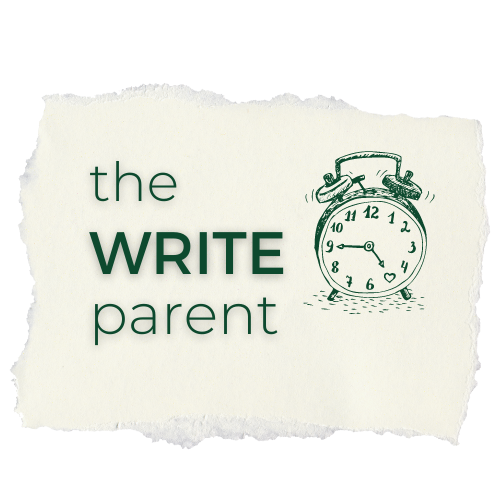10 ways to more writing time
It takes a village to raise a child, Hillary Clinton says.
Before her, we can trace the phrase to Kijita and Swahili proverbs. (According to this NPR article, the precise origins are up for healthy debate.)
The phrase applied to my upbringing, too. Although my parents were my primary caregivers and influences, I hung around and learned from more adults than just my mom and dad.
There was my great-grandmother, who fed me sugared strawberries on TV trays in front of Jeopardy!; my cartwheeling, chain-smoking grandmother; the evangelical daycare lady who spoiled my brother rotten (he’s cool now); a myriad of friends’ parents and parents’ friends; aunts and uncles, sports coaches and music teachers; and the occasional babysitter who looked like she was plucked from Party of Five.
I imagine my parents were working most of that time. They both had jobs, but I say “imagine” because as a kid, I found it hard to conceptualize what they could be doing when I wasn’t around.
As for me, I was learning to interact with adults besides my parents and seeing that my bullshit didn’t fly with people who didn’t create me.
My daughter is three. Last year, we moved from Texas to New York, and, as most of our family lives in the Lone Star State, she lost her built-in village.
Having spent my childhood with family around, I figured it would be a challenge to raise a child and build a writing career without a physical support network. But, as a long-ago convert to New York, this did not make me want to stay in Texas.
I thought we’d find a babysitter or two. That there would be playgroups. That a fairy godmother would show up at our doorstep saying her greatest dream in life was to give two deprived parents a date night.
Cut to the pandemic, which has made finding childcare and support even more challenging for all parents, especially parents who lack the resources to afford it.
To be sure, kids suffer without a village, as this Chirping Moms post details. Perhaps nothing has highlighted this point so well as the two years of educational and social upheaval that COVID-19 ushered in.
Photo by Vera Davidova on Unsplash
But this site is for writer-parents, so let’s focus on us, shall we?
To put it simply: for writers who are parents, insufficient childcare means insufficient productivity. Our work suffers without a village.
(While I’ve heard some writers hint that they’ve thrived in quarantine, none of them have been parents.)
Three of the biggest obstacles writer-parents face in normal times are even more difficult to overcome when the village is in shutdown.
Time scarcity
Parenting takes time. Writing takes time (usually quiet, focused time).
It’s inescapable that the more time we spend doing one, the less time we have for the other.
Of course, no writer has limitless time to write. And by choosing to become parents, one could argue that we signed up for the extra demands on our time.
Self-inflicted or not, it can be a daily challenge to navigate this greater time scarcity, especially during a pandemic.
When quarantine isolated us all from support networks, most parents tried to make up for our kids’ loss of education, extracurriculars, and friends. Who has time to write after working, cooking, teaching, running soccer drills, practicing pirouettes, and playing make believe, all in the same day?
Energy shortage
Nothing drains a person’s energy like taking care of a kid from sun up to sun down.
Sure, your little miracle will eventually nap and sleep come nightfall, but it’s not like you’re buzzing the moment they pass out. After chasing their Energizer bunny butt around all day, it’s more likely you’re not far from the pillow yourself.
And when you feel like taking multiple stimulants is the only way you’ll manage to write a coherent sentence, you’re probably not producing your best work (or being super smart about your health).
A multitude of distractions
The writer-parent’s responsibilities extend far beyond writing and parenting. Like any other adult alive and functioning today, we have chores to do, bills to pay, appointments to make, news feeds to check, workouts to put off, etc.
Even when we do get a break from parenting, what might’ve seemed in theory like a nice pocket of writing time is often re-assigned to the other must-dos of life.
To write well, we must have time, energy, and the ability to focus—all of which are hard to come by in general, especially as a parent, and most especially as a parent post-2020.
After two years of quarantine and isolation as the status quo, I can say without reservation that I’m excited to get back to the village—for my kid’s sake, and for mine.
And while I can’t give you a village, I do have 10 ideas to help you find and make the most of your writing time as a parent, whether or not we’re all standing six feet apart.
(Numbers 1-9 have all worked for me, albeit imperfectly—because such is the life of a writer-parent. I’m challenging myself to try number 10 as soon as I can find a willing participant. (Takers?))
1. Meditate, pray, and/or practice positive self-talk
One of the best ways I’ve found to maximize my writing time is to begin each session with a few minutes of head clearing and intention setting.
I like to sit cross-legged in front of a wall or window and to focus on my breath moving in and out. Setting a timer with a pleasant-sounding alarm can help me forget about the seconds ticking by.
A recent episode of one of my favorite writing podcasts, Writers on Writing, features author April Dávila, who runs a meditation program for writers. She recommends dedicating ten minutes before each writing session to clearing the mind and making room for creativity to flow. (And I recommend the podcast episode!)
2. Go to bed as early as possible and wake up as early as possible
This isn’t always easy or doable for plenty of reasons (e.g., your infant or potty-training toddler is up every few hours, early mornings are your archnemesis, you have a kid who wrote the early-bird-gets-the-worm adage, etc.).
But if you can manage to get into a rhythm—I aim for bedtime at 9:30pm, wake up at 4:30am—the dark, silent morning hours can be the most protected and productive writing time of the day.
Disclaimer: I apologize in advance but take zero responsibility for the mornings when you get up super early and your kid wakes up ten minutes later just to f*ck with you.
3. Reserve your caffeine for naptime
As a person who struggles with anxiety, I limit myself to two cups of coffee a day.
(I should probably limit myself even more but am unwilling to deprive myself of the heavenly taste that results from my pour-over.)
It’s a simple trick, but I’ve found that if I reserve one of those cups for the afternoon when my daughter is napping, it can give me enough of a buzz to overcome the energy slump that comes with rocking her to sleep.
And if I mess up and drink the two cups in the morning, I’m not too hard on myself: that’s what tea is for.
4. Try Pomodoros—with mini workouts in the 5-min breaks
Shout out to my friend and accountability coach Casey Renee Rogers, who introduced me to the Pomodoro® Technique many years back. (Check it out here.)
The 25-minute sessions can do wonders for a writer’s focus, and I’ve found that doing a round of squats or burpees during the 5-minute breaks between sessions increases my heart rate and resets my focus, making for even more productive writing in the following session. I also can say I worked out that day!
5. Record ideas wherever you are
Many of my ideas—brilliant and lackluster—come to me when my daughter and I are walking to the park.
I never leave home, then, without a notebook or my smartphone. It’s a relief to be able to capture my ideas in the moment, knowing I can revisit them when I have time to sit, focus, and write.
It also helps me to enjoy our mother-daughter outing tenfold.
6. If you have a partner, switch off evening chores
When it’s your turn to cook—and your partner is handling bath and bedtime—whip up an easy meal with easy clean up, and use the remaining time to write.
The key for me is to work on the writing I’m able and willing to do after dinner with a glass of wine in hand. (Large-scale revisions are usually out, but generative first drafts are golden!)
7. If your partner works from home, tag team childcare duties
My husband regularly works 60- or 70-hour weeks, but even he can usually find time in his busy schedule to give me an extra hour or two to write.
If your partner has a sane enough work schedule, it might make sense for one of you to take the morning childcare session and the other to take the afternoon.
I mean, sharing is caring, right?
8. Let PBS be a babysitter (within reason, of course)
I spent the first two years of my daughter’s life as a paranoid bodyguard shielding her from screens.
After reading on the pediatrician’s intake form at her 2-year check-up, “Does your child watch more than 2 hours of screens a day?” I realized things weren’t as bad as all that.
These days, if she won’t nap on a weekend or refuses to play by herself, I put on Sesame Street or Daniel Tiger, start up the white noise on my headphones, and write for a half hour (sometimes a whole hour!). Hallelujah.
9. FaceTime the grandparents
This might work better for kids old enough to carry on a conversation, but why not schedule weekly video chats with the out-of-town grandparents?
Ask your supportive parents and/or in-laws to read books or play games with your kid(s) for a half-hour while you stuff in your earbuds and churn out a round of story edits.
10. Let’s start watching each other’s kids again
We can kickstart a return to the village!
Trade off childcare with another vaccinated writer-parent you know and trust.
One day the kids play at her house while you write for a couple of holy hours; the next day you’re in charge of refereeing playtime while your writer-friend gets her words on the page.
So, until we find our way back to the village (or unless you’ve already decided to rethink the nuclear family), I hope these ten tips give you more writing time, energy, and even some peace of mind while you’re at it.
Sláinte, and happy writing!
Erin
Have additional productivity tips for our writer-parent community? Leave your comment below.
***
And subscribe to our community for inspiration, ideas, and more on how to survive and thrive as a writer-parent.




